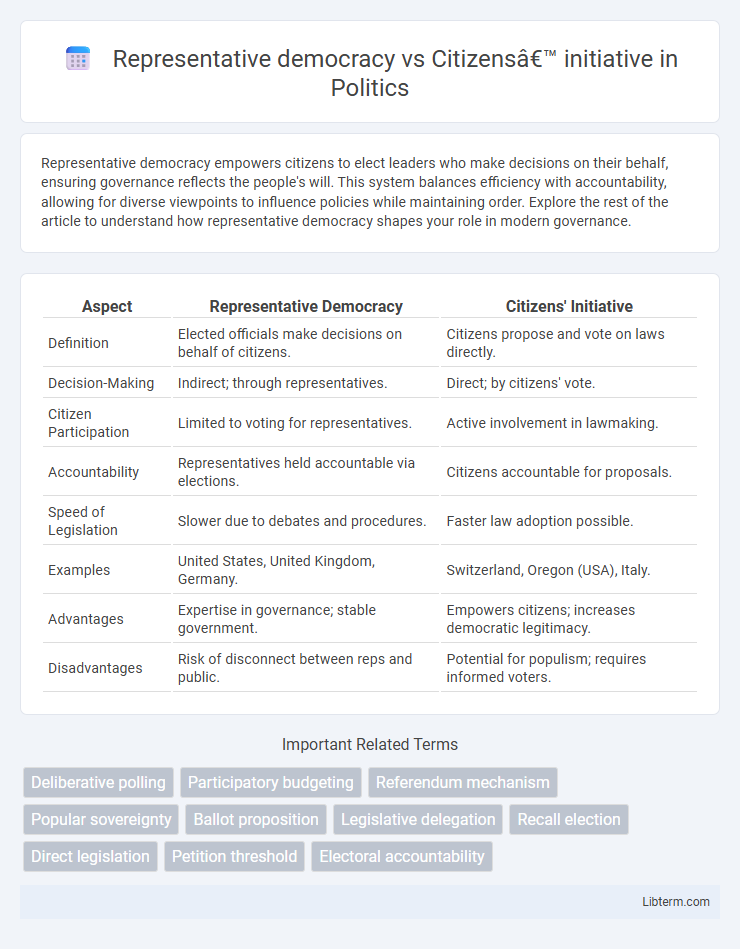Representative democracy empowers citizens to elect leaders who make decisions on their behalf, ensuring governance reflects the people's will. This system balances efficiency with accountability, allowing for diverse viewpoints to influence policies while maintaining order. Explore the rest of the article to understand how representative democracy shapes your role in modern governance.
Table of Comparison
| Aspect | Representative Democracy | Citizens' Initiative |
|---|---|---|
| Definition | Elected officials make decisions on behalf of citizens. | Citizens propose and vote on laws directly. |
| Decision-Making | Indirect; through representatives. | Direct; by citizens' vote. |
| Citizen Participation | Limited to voting for representatives. | Active involvement in lawmaking. |
| Accountability | Representatives held accountable via elections. | Citizens accountable for proposals. |
| Speed of Legislation | Slower due to debates and procedures. | Faster law adoption possible. |
| Examples | United States, United Kingdom, Germany. | Switzerland, Oregon (USA), Italy. |
| Advantages | Expertise in governance; stable government. | Empowers citizens; increases democratic legitimacy. |
| Disadvantages | Risk of disconnect between reps and public. | Potential for populism; requires informed voters. |
Introduction to Representative Democracy and Citizens’ Initiative
Representative democracy is a political system where elected officials make decisions on behalf of citizens, ensuring governance through periodic elections and accountability. Citizens' initiative is a form of direct democracy that allows individuals to propose and vote on legislation or policy changes without intermediary representatives. Both mechanisms enable public participation but differ in the degree and method of citizen involvement in the decision-making process.
Defining Representative Democracy
Representative democracy is a political system where citizens elect officials to make decisions and create laws on their behalf, ensuring governance through elected representatives. This system emphasizes accountability, political stability, and the delegation of authority to experienced lawmakers. In contrast, citizens' initiatives allow direct public participation by enabling voters to propose and vote on legislation without intermediary representatives.
Understanding the Citizens’ Initiative
The Citizens' Initiative empowers individuals to propose legislation or policy changes through direct petition, enabling grassroots participation beyond traditional representative democracy. By collecting a required number of signatures, citizens bypass legislative bodies, ensuring their concerns receive formal consideration and increasing governmental accountability. This mechanism enhances democratic engagement by complementing elected representatives with direct input from the electorate.
Historical Context and Evolution
Representative democracy emerged in ancient Athens, evolving through centuries as elected officials assumed decision-making to balance governance efficiency with public participation. Citizens' initiatives originated in 19th-century Switzerland as a direct democracy mechanism, enabling voters to propose legislation and bypass legislative bodies. Both systems reflect historical shifts toward increasing public influence, shaped by societal demands for accountability and inclusivity in political processes.
Key Differences between Representative Democracy and Citizens’ Initiatives
Representative democracy centers on elected officials making decisions on behalf of citizens, ensuring governance through periodic elections and party systems. Citizens' initiatives empower individuals to propose and vote directly on specific laws or policies, bypassing traditional legislative bodies. Key differences lie in decision-making processes, with representative democracy relying on delegates and citizens' initiatives enabling direct participation, often enhancing grassroots influence and accountability.
Advantages of Representative Democracy
Representative democracy allows citizens to elect skilled leaders who make informed decisions on complex policy matters, ensuring efficient governance and stability. It enables accountability through regular elections and representation of diverse interests within legislative bodies, fostering a balanced approach to lawmaking. This system streamlines decision-making, avoiding the logistical challenges and potential volatility associated with direct citizen participation in every policy decision.
Benefits of Citizens’ Initiatives
Citizens' initiatives empower individuals to influence legislation directly by proposing new laws or amendments, enhancing democratic participation beyond periodic elections. These initiatives increase government accountability and responsiveness by allowing voters to address specific issues not prioritized by elected representatives. The process fosters civic engagement, encourages public debate, and can lead to more transparent and inclusive policy-making.
Challenges and Criticisms of Both Systems
Representative democracy faces challenges such as political polarization, limited direct citizen influence, and the risk of elected officials prioritizing party interests over public needs. Citizens' initiatives encounter criticisms including the potential for populist manipulation, high costs of organizing campaigns, and the complexity of ensuring informed decision-making by the broader electorate. Both systems struggle with issues related to inclusivity, transparency, and maintaining effective checks and balances to protect democratic integrity.
Case Studies: Global Examples and Outcomes
Representative democracy, exemplified by countries like the United States and Germany, allows elected officials to make policy decisions on behalf of citizens, resulting in structured governance and policy continuity. Citizens' initiatives, as seen in Switzerland and California, empower voters to propose and enact legislation directly, promoting greater public participation and accountability. Global outcomes reveal that while representative democracy fosters stability, citizens' initiatives enhance democratic engagement and responsiveness to local issues.
Future Prospects and Hybrid Models
Future prospects for representative democracy increasingly integrate citizens' initiatives to enhance public participation and accountability. Hybrid models combine elected officials' decision-making authority with direct input mechanisms, such as referendums and petitions, to balance expertise and grassroots engagement. This fusion aims to create more responsive governance systems that adapt to evolving democratic demands and technological advancements.
Representative democracy Infographic

 libterm.com
libterm.com